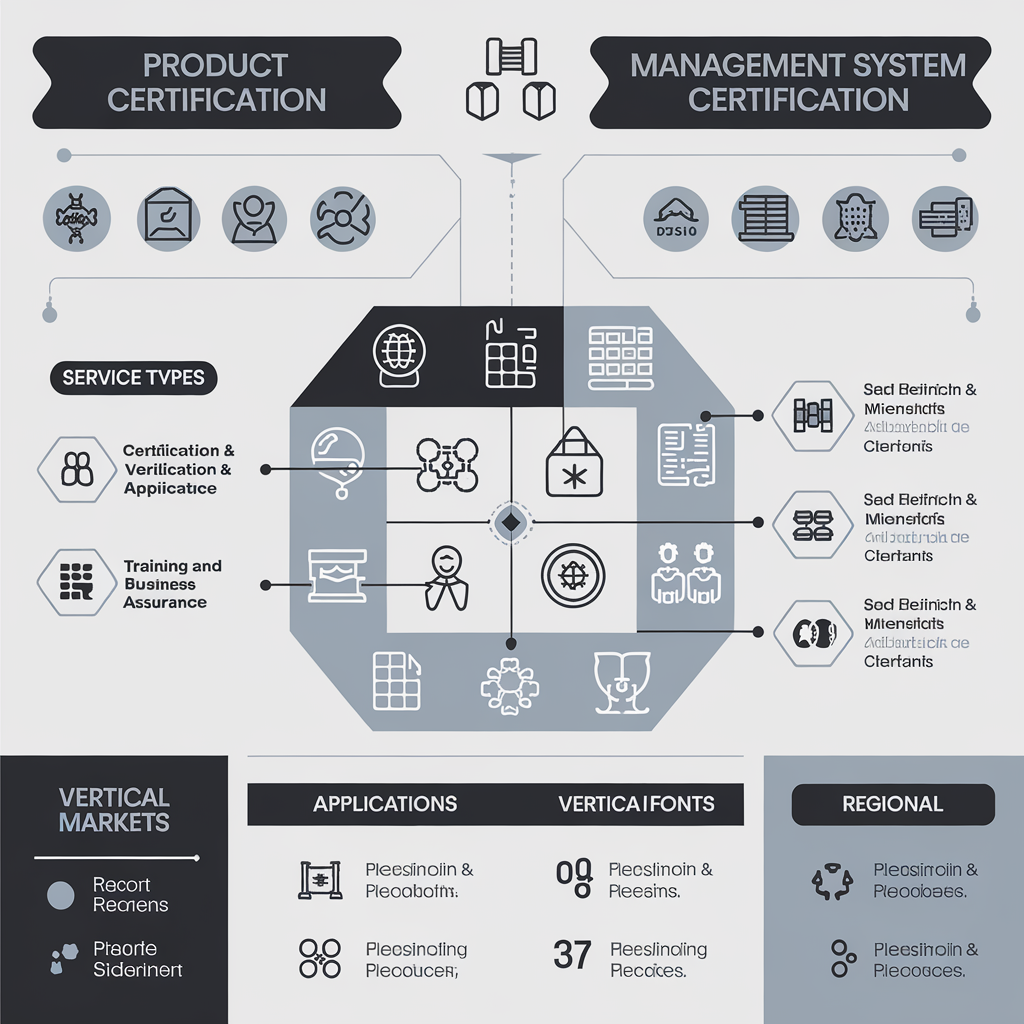The management system certification industry is critical in helping businesses meet international standards, ensuring consistent quality, compliance, and safety across industries. With evolving regulations and increasing demands for sustainable, ethical practices, this industry is poised for significant transformation in the coming years. This article delves into the future of the management system certification industry, analyzing key trends, market growth projections, major companies, regional developments, opportunities, challenges, and segmentation.
Trends Shaping the Future of the Management System Certification Industry
- Digital Transformation: Digital technologies are reshaping the certification process. The adoption of AI, blockchain, and IoT in audits and assessments streamlines operations, enhances accuracy, and minimizes human error.
- Sustainability Focus: Environmental, Social, and Governance (ESG) standards are becoming integral to certifications. With sustainability goals gaining traction globally, certifications related to environmental management (ISO 14001) and energy management (ISO 50001) are seeing increased demand.
- Remote Audits and Virtual Assessments: The pandemic accelerated the shift towards remote audits, which are now becoming a standard practice. This has increased efficiency while reducing costs and time associated with physical audits.
- Cybersecurity Certifications: With the increasing prevalence of digital threats, companies are prioritizing cybersecurity certifications such as ISO 27001. This trend is expected to rise as organizations focus on securing sensitive data and complying with data protection regulations.
- Globalization and Trade Compliance: The push for global trade integration is driving demand for certifications that enable companies to comply with international regulations. Standards such as ISO 9001 for quality management and ISO 45001 for occupational health and safety are crucial for international operations.

Download PDF Brochure @ https://www.marketsandmarkets.com/pdfdownloadNew.asp?id=202845337
Management System Certification Market Growth Projection
The management system certification market is projected to experience steady growth over the next decade. Several factors drive this expansion:
- Rising demand for ESG compliance: As businesses face increasing pressure from stakeholders and governments to demonstrate sustainability practices, certifications in environmental management systems are expected to grow significantly.
- Growth of digitalization: The integration of digital technologies in certification processes will streamline operations, leading to increased demand for IT and cybersecurity-related certifications.
- Emerging economies: The rapid industrialization and globalization of emerging markets in Asia-Pacific and Latin America are expected to boost the adoption of management system certifications, contributing to overall market growth.
Top Companies in the Management System Certification Industry
Several key players dominate the global management system certification market, offering a wide range of services across different sectors:
- SGS Group: A global leader in inspection, verification, and certification, offering a broad range of services across industries.
- Bureau Veritas: Specializes in quality, health, safety, and environmental certification, serving industries from aerospace to agriculture.
- Lloyd’s Register Group: Focuses on providing certifications for energy, infrastructure, and manufacturing industries.
- DNV GL: Known for its certification services in sustainability, energy, and maritime sectors.
- TÜV SÜD: Provides extensive certification services in automotive, manufacturing, and IT sectors.
- Intertek: Offers comprehensive services for quality assurance and product testing alongside certification in diverse industries.
Regional Analysis of the Management System Certification Industry
- North America: The U.S. and Canada lead in cybersecurity and quality management certifications due to stringent regulatory frameworks and technological advancements. The region also has a growing focus on sustainability, boosting demand for environmental management certifications.
- Europe: Driven by strong ESG regulations, Europe is a key market for environmental and quality certifications. The region is also witnessing an uptick in cybersecurity certifications as businesses align with GDPR and other data protection mandates.
- Asia-Pacific: Rapid industrialization, along with growing export opportunities, is pushing the demand for management system certifications in the region. Countries like China, India, and Japan are emerging as significant players, focusing on safety, quality, and environmental standards.
- Latin America: The increasing globalization of trade in Latin America has led to a growing demand for certifications, particularly in manufacturing, agriculture, and energy sectors.
Opportunities in the Management System Certification Industry
- Expansion in Emerging Markets: The industrial growth in emerging economies presents substantial opportunities for management system certifications, particularly in sectors like energy, manufacturing, and transportation.
- Increasing Focus on ESG Compliance: As businesses strive to meet sustainability goals and adhere to ESG standards, there is a growing opportunity for certification bodies to offer services in environmental and energy management systems.
- Technological Advancements: Digital innovations such as blockchain and AI will create opportunities for certification bodies to improve accuracy and transparency in audits, potentially offering new certification categories related to data integrity and digital process validation.
Challenges Facing the Management System Certification Industry
- Complex Regulatory Landscape: The varying international standards and regulatory requirements across regions can create challenges for certification bodies to maintain consistency and ensure compliance across borders.
- High Costs of Compliance: Small and medium enterprises (SMEs) may struggle with the high costs associated with achieving and maintaining certifications, which could limit their participation in global markets.
- Increasing Competition: The management system certification industry faces intense competition from a growing number of certification bodies, making differentiation in services and pricing a challenge for established players.
Management System Certification Industry Segmentation
The management system certification industry can be segmented based on several factors, including:
- Certification Types: Environmental management, quality management, occupational health and safety, information security management, energy management, and more.
- Industry Verticals: Automotive, manufacturing, construction, energy, food and beverage, healthcare, IT, and others.
- Organization Size: Large enterprises, small and medium enterprises (SMEs).
- Services: Auditing, certification, re-certification, training, and consulting services.
The management system certification industry is evolving, driven by technological advancements, rising sustainability demands, and increased focus on cybersecurity. As businesses worldwide seek to enhance compliance and operational efficiency, the demand for certification services will continue to rise. However, the industry must navigate challenges such as regulatory complexities and rising competition to capitalize on emerging opportunities. With steady market growth expected, companies offering innovative, cost-effective certification solutions will thrive in this dynamic landscape.
